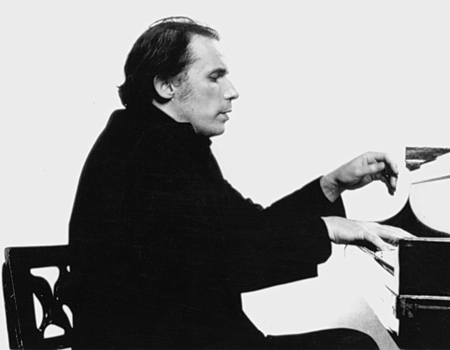by Jarrett Hoffman

•Today: Todd Wilson & Friends at Trinity, and the trio Love in Exile at CMA
•Announcements: Applications for Local 4’s She Scores and the Ohio Arts Council’s Artists with Disabilities Access Program, CIM piano faculty opening, and new faces at No Exit
•Almanac: two tales of Glenn Gould — a disagreement with Leonard Bernstein, and his last performance with orchestra
HAPPENING TODAY:
Trinity Cathedral’s Brownbag series begins today at noon with “Todd Wilson & Friends.” The organist will be joined by Danna Sundet (English horn and oboe), Dylan Moffitt (percussion), and Pamela Kelly (cello) in works by Jan Koetsier, Pierre Cochereau, Rachel Laurin, Craig Phillips, Calvin Hampton, and Marcel Dupré (program details in our Concert Listings). A freewill offering will be taken up. Watch in person or online.
And at 7:30 pm, Love in Exile — the trio of vocalist Arooj Aftab, pianist Vijay Iyer, and multi-instrumentalist Shahzad Ismaily — will visit the Cleveland Museum of Art’s Gartner Auditorium in a presentation by CMA and the Grog Shop. Aftab describes the project as being “about self-exile, and the search for freedom and identity, and finding it through love and music.” Tickets are available here.
ANNOUNCEMENTS:
Applications are now open for the Local 4 Music Fund’s 2024 She Scores series, open to female-identifying and nonbinary composers living or working in Ohio, Michigan, Pennsylvania, Indiana, West Virginia, or Kentucky. The deadline for submissions is January 5. Details here.
Another application deadline approaching, this one on November 1: the latest round of the Ohio Arts Council’s Artists with Disabilities Access Program. More information here.
The Cleveland Institute of Music has an opening for a full-time member of the piano faculty, with employment to begin July 1. Review of applications will begin on October 16 and will continue until the position is filled. Find out more here.
And No Exit has announced the addition of two new members to the ensemble: pianists Shuai Wang and Rob Kovacs.
TODAY’S ALMANAC:

And speaking of maverick interpretations, our almanac entry last month concluded with the mention of a couple of “conductorial tiffs” in which the pianist found himself, including one with Leonard Bernstein, who made a pre-concert announcement to distance himself — albeit very respectfully — from some of Gould’s choices in Brahms’ First Concerto.
Today, exactly 41 years removed from the pianist’s passing, let’s take a closer look at that moment when Bernstein took the mic at Carnegie Hall on April 6, 1962 at a concert with the New York Philharmonic.
Among the highlights of Bernstein’s remarks:
You are about to hear a rather, shall we say, unorthodox performance of the Brahms D-Minor Concerto. A performance distinctly different from any I’ve ever heard, or even dreamt of for that matter, in its remarkably broad tempi and its frequent departures from Brahms’ dynamic indications.
I cannot say I am in total agreement with Mr. Gould’s conception…I have only once before in my life had to submit to a soloist’s wholly new and incompatible concept — and that was the last time I accompanied Mr. Gould. But this time the discrepancies between our views are so great that I feel I must make this small disclaimer.
Then why…am I conducting it?…Because I am fascinated, glad to have the chance for a new look at this much-played work. Because, what’s more, there are moments in Mr. Gould’s performance that emerge with astonishing freshness and conviction. Thirdly, because we can all learn something from this extraordinary artist, who is a thinking performer.
And finally because there is in music what Dimitri Mitropoulos used to call “the sportive element,” that factor of curiosity, adventure, experiment — and I can assure you that it has been an adventure this week collaborating with Mr. Gould on this Brahms concerto. And it’s in this spirit of adventure that we now present it to you.
Listen to the speech and the performance on YouTube, and read about critics’ reactions to both here.
On another note, perhaps it is fitting to mark the end of Gould’s life with the final work he performed with orchestra before withdrawing, as Daniel Hathaway has put it, “into a private world of highly-edited studio recordings.”
Just like with the previous story, there’s a theatrical element here as well, though through no fault of the pianist or the conductor. Performing from memory a work he hadn’t laid a finger on in four years, on 72 hours notice after the withdrawal of Arturo Benedetti Michelangeli, Gould stepped in front of the Toronto Symphony, led by Karel Ančerl, to play Beethoven’s “Emperor” Concerto in a performance on September 12, 1970 that would be televised months later. Watch it here.



